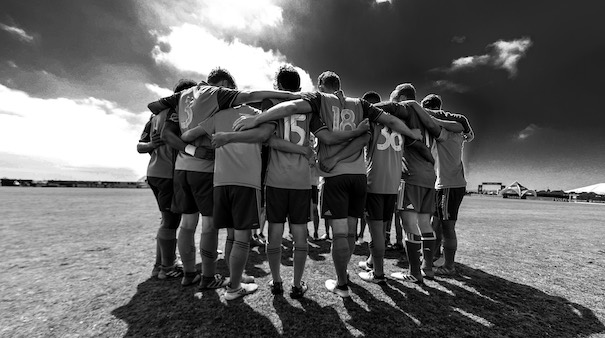When should soccer players change teams?

The question of whether or not to change teams is something I know is in the minds of a lot of youth soccer players and their families every off-season. It seems like such a simple, direct question for a player to ask themselves “should I change teams?” The answer is even more direct, just two or three letters needed – a simple “no” or “yes.”
The problem of course is many players usually are not the ones asking themselves the question in the first place, or they are asking it for the wrong reasons. Sadly, most often the very idea of moving teams is planted by a parent, who in most cases is not even remotely qualified enough to judge a good program or coach. Still other times the question is asked by both player and parent based on the incorrect metric of a team’s winning record, rather than the quality of the learning and existence of a long-term development plan.
Especially at the younger ages, there is far too much focus on what team a player plays for instead of what they are doing to develop the basic fundamentals of the game… to connect those important synapses when their brains are most malleable.
Some parent-initiated player movement between under-9 and under-12 is understandable if the player is the first one in a family to play travel soccer. This is because parents can be excused for making the wrong initial decision after buying into a sales pitch from a coach who actually has no idea what they’re doing, or by just sliding right into the travel program offered by their recreational club without investigating what else is out there.
However, with a little investigation by even “first time travel parents,” it should become clear whether a potential coach is focusing on the right things at the early ages. Namely, perfecting technical skills, fostering creativity, encouraging risk taking, and generally doing anything they can to instill a true love of the game.
If the coach of a u10 team is playing kids in the same position every game, not keeping playing time from “top to bottom” within 15% variance, and spends entire practices working on set-plays, offside traps, and formations, then there’s a problem for sure.
However, the existence of a problem still doesn’t mean a team change is in order. Soccer is a popular sport, and there is a shortage of good coaches overall, let alone at the younger ages where the best “teaching coaches” should be focusing their time.
Why is it not automatically time to move, even if your coach is no good at under-11? Because – news flash – not every player is Ronaldo or Kaka or Mia or Abby.
Believe it or not, most kids will never play beyond high school, or in ODP, or see the late rounds of a state cup from the field (not the bench). It just isn’t going to happen for most, no matter how may times they change teams, or how much a parent spends in time and money.
Soccer is not the public school system. You don’t do everything you can to place your kid with the best teachers, or move homes to get in the best schools. Twelve years of formal education is far more important in the grand scheme of things than whether or not a kid wins an under-15 state cup. Soccer is also not a medical condition, where a parent never rests until the best minds are solving the problem, and they never take no for an answer. Those are things American families are rightfully entitled to, and those are things that parents actually can do to help make a life-changing difference. Soccer, on the other hand is just a game. It has benefits of course, but parents pushing too hard, or encouraging a player’s over-inflated ego, can also hurt.
For some players though, soccer is much more than a game. Without any pushing from parents, the game becomes their passion, their life. It was and is this way for me, “after all”, I tell my non-soccer-getting friends, “How can 2 Billion people be wrong?” For those players, soccer is what they’d rather be doing than anything else. They are always out in yard, garage or basement practicing tricks. They are always watching on TV and asking to go to live games. Their email or IM address has something about soccer in the name. And, as soon as they feel the team they’re on is no longer teaching them anything, they start asking about looking for a new place to play.
Those are the players who should be changing teams. But they, too, should be changing for the right reasons. For starters, they should not be over-estimating their own abilities and talent. Scoring more goals than anyone else because they were first to have a growth spurt, does not make them better than everyone else. It doesn’t mean they still don’t have a ton to learn from their current team, like how to always be learning!
Still, at any age under 12, it should take an enormous list of pros over cons to leave a team with a good coach in place, who is focusing on the right things – winning or losing. The player should clearly be way beyond every one of their teammates – not just “best” at one thing out of 20 – or the coach has run out of things to teach. Then, start looking, but take your time, and if you do leave, do it the “right” way. [For my thoughts on that topic, read my “The Departed Player” column.]
For the top 5% of players, changing teams around under-15 to go a team that is going to college showcases can be a shrewd move, possibly initiated by a parent, but certainly something the player enthusiastically endorses because they want to get better. If they really do want to play in college, and have experienced at least one year of high school dealing with the work-load of being a student athlete, then they do have to be on a team where they not only go to college showcases, but where they will PLAY in front of those coaches.
However, they don’t have to be on that team when they’re 13, just be sure they’ll have a spot when they’re 16. Trust me, if they’re good enough, they’ll get on that team when it matters. There is so much drop out from the sport once high school hits, that nearly every team is looking for new, quality players.
If you really just can’t stand back and hope your son or daughter burns for the game the way you do, then instead of spending your money moving them from team to team or chasing tournaments, summer camps, clinics, and private trainers, try this… From age 10 to 12, spend your money on going to watch more live professional teams and college games, or take a family vacation to see the National Team play in a couple World Cup Qualifiers. If after the third live game, your son or daughter isn’t asking when the next one is, wearing a jersey, and looking up tricks on youtube, then they probably don’t care as much about the game as you wish they would, at least not yet.
This is not the end of their soccer potential though. They can still decide later that they want to play at a higher level. There is not some secret window they have to climb through before they turn 12, or else! Until that future decision is made by them, in their heart, anything you do to try and force it is probably doing more harm than good.
So, if your kid is not coming up with the idea to change teams at all, no matter how good they really are, LET THEM BE. Let them love the game, spend time with friends, and get great exercise. After all, it’s just a game.











